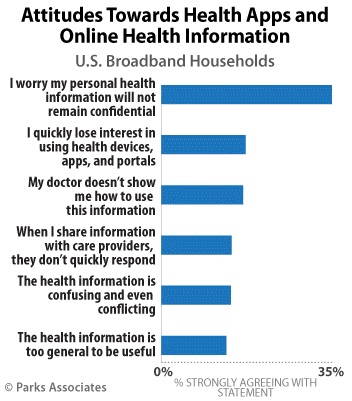 Some 23 percent of US broadband households said they are concerned about privacy and security when using connected health devices. Additionally, 23 percent of US broadband households have security and privacy concerns when using connected fitness tracking devices.
Some 23 percent of US broadband households said they are concerned about privacy and security when using connected health devices. Additionally, 23 percent of US broadband households have security and privacy concerns when using connected fitness tracking devices.
The percentage of households who are concerned with the privacy and security of health and fitness devices is actually much lower than the concern about other connected devices. Some 40 percent were concerned with the security of smart door locks, 42 percent were concerned with the security of tablets, and 41 percent were concerned with the privacy and security of smartphones.
“The connected health industries, device manufacturers, and app developers not only need to ensure they have strong security measures in place but also that consumers are aware of the steps they are taking to protect their data,” Parks Associates Director of Health and Mobile Product Harry Wang said in a statement. “Already 35 percent of consumers worry their personal health information will not remain confidential if online, and with high-profile data hacks making big headlines, consumers are expecting companies to take strong security measures to protect them.”
Just last week, at a US House of Representatives Judiciary Committee hearing about the Internet of Things, Gary Shapiro, CEO and President of the Consumer Electronics Association, discussed privacy of connected health devices. He said legislative focus should be on transparency, so that patients can give data to companies if they wish to and if it’s in their best interests, but will never have their data used without their knowledge.
“If you put too much of a line around privacy, you’re trading off opportunities for new services that businesses will provide,” Shapiro said. “I think what companies need to provide is transparency, and then consumers will make a reasoned decision about what they’re willing to give up in return for [some benefit]. I think it’s premature for Congress to draw the line, but having the discussion is really important. I think there should be a national consensus and people should have the freedom to share data."















